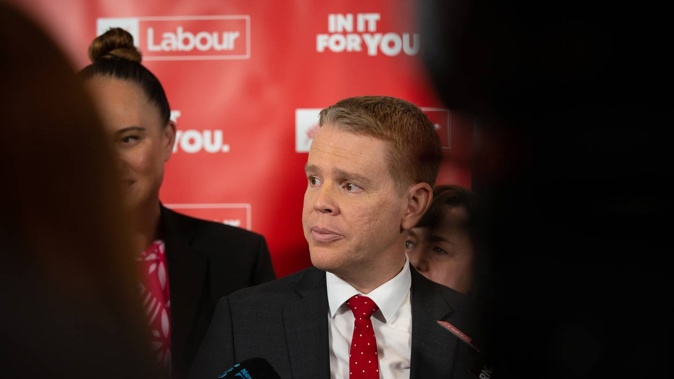
Labour leader Chris Hipkins has promised to lead a prime ministerial trade delegation to India within the first 100 days of taking office if Labour wins the upcoming election.
Laying out his party’s economic strategy today, Hipkins said India would be a priority next term.
“After securing trade deals with the UK and EU this year, my next priority will be to lead a Prime Ministerial delegation to India within the first 100 days of a new Government,” he said. Hipkins met Indian Prime Minister Narenda Modi in Papua New Guinea earlier this year, where Modi invited Hipkins to visit India.
The announcement came alongside a five-point economic growth fund and a pledge for $100m of public money to be given to the Government’s Venture Capital Fund to invest in agritech.
Labour has faced allegations it was ignoring India, now the world’s most populous country, since before the Covid-19 pandemic. Former Prime Minister Jacinda Ardern never visited the country. The last prime ministerial visit was by John Key in 2016. Trade Minister Damien O’Connor has just returned from a large trade mission to the country.
In 2019, former National leader Simon Bridges visited India and beat the drum for advancing trade talks with, and direct flights to, the country.
At Deloitte and Chapman Tripp’s BusinessNZ election conference on Tuesday, Luxon repeated that plea.
“I’m expecting my trade minister and foreign minister to be on planes to do business.
“I know I keep saying it, but India is a priority for us. I know it will be hard but trade with India two-way has gone backwards for us over the last six years,” Luxon said.
/cloudfront-ap-southeast-2.images.arcpublishing.com/nzme/K6MHN3MEENAODC65LY2BR3Z4BM.jpg) National leader Christopher Luxon has also promised a swift trip to India. Photo / Mark Mitchell
National leader Christopher Luxon has also promised a swift trip to India. Photo / Mark Mitchell
Two-way trade with India was worth $2.74 billion in 2017 and is worth $2.62b now. Exports have dramatically fallen, having been worth $1.88b in 2017 compared with $1.07b now. Two-way trade with China is worth $40.3b by comparison.
National has said it wants to pursue a Free Trade Agreement (FTA) with India, something India itself has said it does not desire, preferring to focus on other parts of the relationship.
Hipkins talked-up Labour’s impressive record on trade deals, having inked agreements with the EU and UK this term, and presided over an upgrade to the China FTA.
“Free trade agreements now cover almost three quarters of New Zealand’s exports. A key focus next term will be to expand those opportunities further,” Hipkins said.
“Our ambition is to grow the agritech sector to $8 billion by 2030. To achieve that goal Labour will inject $100 million into the Venture Capital Fund to support this objective.
“This fund will invest in agritech businesses, including through their joint investment fund with Finistere Ventures developed through the Agritech ITP [Industry Transformation Plan],” he said.
Hipkins set out five economic priorities for the next term, which were:
- Labour’s economic priorities for the next term will:
- Grow an export-led economy with a strong global reputation
- Turn New Zealand into a Centre of Excellence for sustainable agriculture and agricultural technology
- Be a global leader in renewable energy
- Harness New Zealand’s digital creativity and expertise
- Boost our premium tourism offering
He said these would be underpinned by:
- High-paying jobs
- Building infrastructure that lasts
- Better skills and practical education for better jobs
- A balanced fiscal plan
Hipkins is trying to take the economic fight to National over its tax plan. While the large tax cuts would appear to be popular, the way the party has promised to pay for them has come under scrutiny.
Labour claims that the “foreign buyers ban”, which would pay for $2.95b of the $14.6b cost of the plan does not add up, because the tax itself is incompatible with international tax law and the assumed number of house sales is unachievable.
Labour’s finance spokesman Grant Robertson said that “unlike National’s dodgy numbers, Labour’s plan doesn’t require billions of dollars of Kiwi homes to be sold off overseas year-on-year.
“We’re going to focus on selling our goods and services to the rest of the world, not selling ourselves like Christopher Luxon wants to do – that’s a road to ruin and loss of control,” Robertson said.
Hipkins also hinted at further tourism changes. Since 2017, Labour has been trying to shift New Zealand up the value chain when it comes to tourism, fearing that some sites are becoming over-touristed.
“New Zealand will always be a beautiful place people want to explore and visit. But a high-volume tourism strategy puts at risk the attractiveness of our offering,” Hipkins said.
“The Government is working with the industry through the Tourism Industry Transformation Plan to build a more sustainable and higher value industry that doesn’t overstep its social licence,” he said.
Thomas Coughlan is Deputy Political Editor and covers politics from Parliament. He has worked for the Herald since 2021 and has worked in the press gallery since 2018.
Take your Radio, Podcasts and Music with you









